Related Research Articles

Charles Hardin Holley, known as Buddy Holly, was an American singer and songwriter who was a central and pioneering figure of mid-1950s rock and roll. He was born to a musical family in Lubbock, Texas, during the Great Depression, and learned to play guitar and sing alongside his siblings. Holly's style was influenced by gospel music, country music, and rhythm and blues acts, which he performed in Lubbock with his friends from high school.
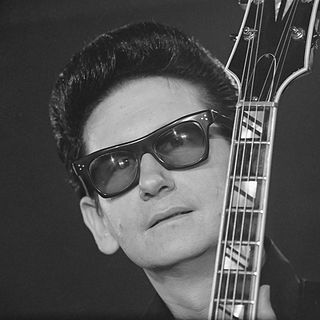
Roy Kelton Orbison was an American singer, songwriter, and musician known for his impassioned singing style, complex song structures, and dark, emotional ballads. His music was described by critics as operatic, earning him the nicknames "The Caruso of Rock" and "The Big O". Many of Orbison's songs conveyed vulnerability at a time when most male rock-and-roll performers chose to project machismo. He performed while standing motionless and wearing black clothes to match his dyed black hair and dark sunglasses.
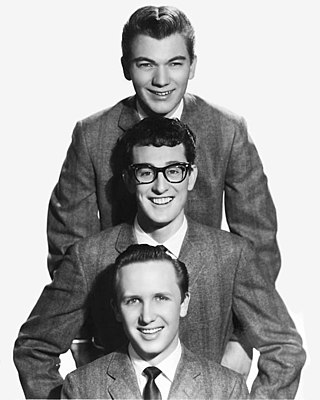
The Crickets were an American rock and roll band from Lubbock, Texas, formed by singer-songwriter Buddy Holly in January 1957. Their first hit record, "That'll Be the Day", released in May 1957, peaked at number three on the Billboard Top 100 chart on September 16, 1957. The sleeve of their first album, The "Chirping" Crickets, shows the band line-up at the time: Holly on lead vocals and lead guitar, Niki Sullivan on rhythm guitar, Jerry Allison on drums, and Joe B. Mauldin on bass. The Crickets helped set the template for subsequent rock bands, such as the Beatles, with their guitar-bass-drums line-up, performing their own self-written material. After Holly's death in 1959 the band continued to tour and record into the 1960s and beyond with other band members through to the 21st century.
Joe Melson is an American singer and a BMI Award-winning songwriter best known for his collaborations with Roy Orbison, including "Only the Lonely" and "Crying", which are both in the Grammy Hall of Fame and have both been included in Rolling Stone's 500 Greatest Songs of All Time. Melson was inducted into the Nashville Songwriters Hall of Fame in 2018.

Thomas David Roe is a retired American rock and pop singer-songwriter.
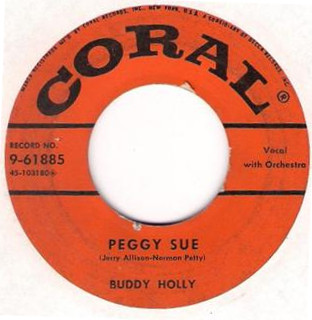
"Peggy Sue" is a rock and roll song written by Jerry Allison and Norman Petty, and recorded and released as a single by Buddy Holly on September 20, 1957. The Crickets are not mentioned on label of the single, but band members Joe B. Mauldin and Jerry Allison (drums) played on the recording. This recording was also released on Holly's eponymous 1958 album.

Jerry Ivan Allison was an American musician. He was best known as the drummer for the Crickets and co-writer of their hits "That'll Be the Day" and "Peggy Sue", recorded with Buddy Holly. His only solo chart entry on the Billboard Hot 100 was "Real Wild Child", issued in 1958 under the name Ivan. Allison was inducted into the Rock and Roll Hall of Fame in 2012.
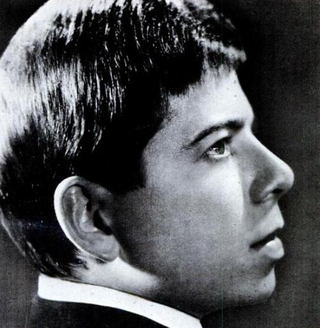
Robert Charles Goldsboro is an American pop and country singer and songwriter. He had a string of pop and country hits in the 1960s and 1970s, including his signature No. 1 hit "Honey", which sold over 1 million copies in the United States, and the UK top-10 single "Summer ".

Buddy Wayne Knox was an American singer and songwriter, best known for his 1957 rock hit song, "Party Doll".

"Only the Lonely (Know the Way I Feel)" is a 1960 song written by Roy Orbison and Joe Melson. Orbison's recording of the song, produced by Fred Foster for Monument Records, was the first major hit for the singer. It was described by The New York Times as expressing "a clenched, driven urgency". Released as a 45 rpm single by Monument Records in May 1960, "Only the Lonely" went to No. 2 on the United States Billboard pop music charts on 25 July 1960 (blocked by Brenda Lee's "I'm Sorry") and No. 14 on the Billboard R&B charts. "Only the Lonely" reached number one in the United Kingdom, a position it achieved on 20 October 1960, staying there for two weeks (out of a total of 24 weeks spent on the UK singles chart from 28 July 1960). According to The Authorized Roy Orbison, "Only the Lonely" was the longest charting single of Orbison's career. Personnel on the original recording included Orbison's drummer Larry Parks, plus Nashville's regulars, Floyd Cramer on piano, Bob Moore on bass, and Hank Garland and Harold Bradley on guitars, Joe Melson and the Anita Kerr Singers on backing vocals. Drummer Buddy Harman played on the rest of the songs on the session.
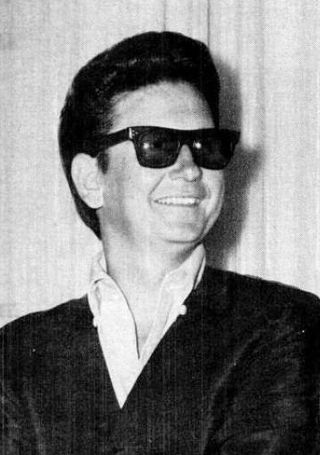
Roy Orbison was an American singer-songwriter who found the most success in the early rock and roll era from 1956 to 1964. He later enjoyed a resurgence in the late 1980s with chart success as a member of the Traveling Wilburys and with his Mystery Girl album, which included the posthumous hit single "You Got It". At the height of his popularity, 22 of Orbison's songs placed on the US Billboard Top 40 chart, and six peaked in the top five, including two number-one hits. In the UK, Orbison scored ten top-10 hits between 1960 and 1966, including three number-one singles.

"Peggy Sue Got Married" is a song written and performed by Buddy Holly. It was posthumously released in July 1959 as a 45-rpm single with "Crying, Waiting, Hoping". It refers to his 1957 hit song "Peggy Sue". It was one of the first sequels of the rock era.

"Crying, Waiting, Hoping" is a song written by Buddy Holly. It was released in 1959 as the B-side to "Peggy Sue Got Married". Three versions of Holly's recording were released: the 1959 commercial release, the 1964 reissue with different orchestration, and Holly's original, private home recording.

"Oh, Pretty Woman" or simply "Pretty Woman" is a song recorded by Roy Orbison, written by Orbison and Bill Dees. It was released as a single in August 1964 on Monument Records and spent three weeks at number one on the Billboard Hot 100 from September 26, 1964, the second and final single by Orbison to top the US charts. It was also Orbison's third single to top the UK Singles Chart.

Roy Orbison's Sun recordings were made by Orbison at Sun Studio with producer Sam Phillips. Sun Records was established in 1952 in Memphis, Tennessee, and during an eight-year period Phillips recorded such artists as Roy Orbison, B.B. King, Howlin' Wolf, Ike Turner, Rufus Thomas, Elvis Presley, Johnny Cash, Jerry Lee Lewis, Carl Perkins, Harold Jenkins, and Charlie Rich. The musicians signed at Sun Records made music that laid the foundation of rock and roll in the 20th century.
Harold David Box was an American rock and roll musician in the early 1960s. Box was influenced by fellow Texan Buddy Holly, and even took his place as singer of his group, The Crickets, for a short time after Holly's death. Box also collaborated with Roy Orbison, and found local success with his own group, the Ravens.
Henry Earl Sinks, known professionally as Earl Sinks, was an American rock and roll singer-songwriter and actor. Sinks had a successful musical and acting career from the 1950s to the 1990s before retiring. He was best known for his long music career, including his brief tenure as a member and occasional lead singer of the Crickets from 1958 to 1960, and for his acting roles in numerous low-budget movies and TV shows in the 60s.

"It's So Easy!" is a rock-and-roll song written by Buddy Holly and Norman Petty. It was originally released as a single in 1958 by the Crickets but failed to chart. It was the final release by the Crickets when Holly was still in the band.

Rockin' 50's Rock'n'Roll is a rock and roll album by the Crickets. It was The Crickets' first release in the 1970s, and marked the band's embrace of their legacy as Buddy Holly's backing band. The album is a concept album of nostalgia for the 1950s, consisting mostly of songs written by Holly and framed by the new retrospectively-minded title track. Originally released as an LP record in December 1970, the album was re-released on CD by in 2000.
John Rainey Adkins was a self-taught guitarist and songwriter from Dothan, Alabama. Adkins experienced commercial success in America during his music career in the 1960s and 1970s with the bands The Candymen and Beaverteeth. Adkins' bands played live on The Ed Sullivan Show, American Bandstand, and NBC's Midnight Special.
References
- ↑ Ray Rush | LoneStarStomp bio
- ↑ Dean, Maury. Rock and Roll:Gold Rush. 2003. p. 64.
- ↑ Gerron, Peggy Sue. Whatever Happened to Peggy Sue? 2008. p. 279.
- ↑ Lergessner, James. Cloudland: Queen of the Dance Halls. 2013. p. 128.
- ↑ Amburn, Ellis. Buddy Holly: A Biography. 2014.
- ↑ Kruth, John. Rhapsody in Black. 2013.
- ↑ Escott, Colin. Good Rockin' Tonight. 2011.
- ↑ Lehman, Peter. Roy Orbison: Invention of an Alternative Rock Masculinity. 2010. p. 198.
- ↑ Billboard. "Legal Battle over Thomas". July 9, 1966. p. 3.
- ↑ Billboard. "Thomas Stays with Scepter". May 4, 1968. p. 71.
- ↑ Billboard. Int'l Artists Producing in New Expansion Moves. Mar. 15, 1969. p. 3.
- ↑ Billboard. May 24, 1969. p.76.
- ↑ Laurie Jasinski, ed. The Handbook of Texas Music. 2012.
- ↑ Ingman, John. A.O.K.: Record Labels of West Texas & New Mexico.